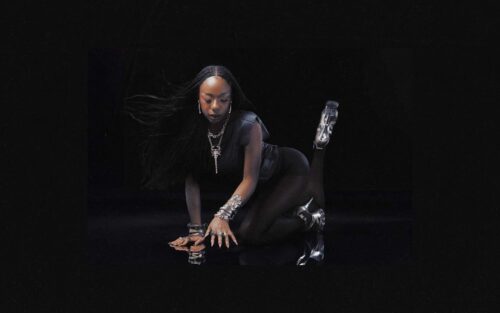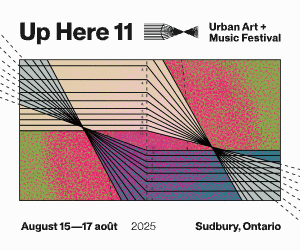Inside Loig Morin's Music Lab
The electronic experimentalist taps into the rhythm of the seasons with Adieu Hiver.
By Ben Boddez
Photo by Arun Nevader (Getty Images)
- Published on
After moving in 2010 from his hometown of Brittany, France to Vancouver in search of new opportunities for himself and his growing family, music took a bit of a backseat as he shifted through odd jobs. Now settled and established in his west coast surroundings, Morin was feeling an itch to throw himself into a project in a city that can sometimes have wild mood swings when it comes to the weather — it was then that the inspiration struck.
In 2020, Morin released the seasonally-inspired Printemps (spring) and followed it up with Automne (Autumn) in 2021. Now, he is gearing up for the release of the winter-themed album, Adieu Hiver (out May 26), with a prospective summer project on the horizon. Each album finds Morin shifting his sound slightly. Heavily inspired by 80s new wave and a lifelong obsession with New Order, the enticing experimentalists mirrors the shifting temperatures, sights and sounds of a typical Vancouver day at different times throughout the year – from the bright, acoustic indie-pop and orchestral sounds of spring to the ambient tones of autumn and what he calls a “synthetic” vibe with his upcoming, frigid tunes.
While the project was initially supposed to be released over the space of a little over a year, Morin now understands that while he still wants to finish the project, he prefers to wait until he has something to say that’s as strong as his desire to make the music itself.
“I wanted to produce and write music urgently.”
“At the beginning, it was because I wanted to produce and write music urgently,” he says. “And I thought ‘the four seasons’ was good, because you only have a few months before the season changes. I was ready to launch Adieu Hiver a few months after Automne, but I didn’t feel good. It wasn’t writing [itself] yet. And that’s good, that means that after two albums in a row, I didn’t have enough energy or enough stuff in my life to write a new album.”
A restless music lover like Morin can’t stay in one place for too long. He admits that he’s already eager for the four seasons project to be over, so that he can be free to explore in any creative direction that strikes him. He’s even begun reimagining some of his older tracks, like with the recent release of a remixed and reimagined recording of Printemps’ opening track, “Tu m’avais pourtant dit” that came accompanied with a music video filmed in the province’s oldest theatre, the Columbia in New Westminster.
The video finds him surrounded by analog machines, singing in his deep and dramatic voice while flipping switches, playing the track live and demonstrating his prowess as a DJ – there’ll be no simple press of a button to play the track for Morin. Still, Morin had to make the most of his limited time in the theatre to capture something great.
“One day I went to the Columbia Theatre and I felt something really interesting. It’s like a time machine,” he says. “I felt like I was in the 30s, or the 60s. I talked with the team and said I was a musician, and I’d love to play in your theatre to film my music video, and I asked them ‘But how much will it be?’ And they said ‘We listened to your music, we really like it and we love to help musicians, so we can give you the theatre for one day.’ The remix was to show people I can play everywhere, and I don’t want to play the same thing that they can hear on the album when people come to see it live.”


Morin’s music could be classified as a mishmash of new wave, indie-pop and the kind of electronica that has always dominated his home country of France, but he’s an experimentalist at heart who isn’t the biggest fan of labels. His influences are widely diverse as well – he’s a huge fan of Justice, but his last couple visits to a record store have seen him picking up Jack White, Arctic Monkeys and the Wu-Tang Clan. Still, he sees himself as a part of his country’s ongoing contribution to innovative and influential electronic music.
“It’s true, when you’re French, you have something. Maybe it’s something we don’t know. You have the arrogance, for sure,” he laughs. “People love something with our music. Maybe it’s because Daft Punk, when they started, they didn’t care about the code. They just did their stuff, and it was really different. But for me, I love to put in some lyrics as well, because there’s always something I want to say.”
As someone who ended up as a cook while trying to find his footing in Vancouver – the story goes that he falsely claimed he had experience while meeting someone looking for a job busking, which allowed him to get his foot in the door to play guitar for the restaurant’s guests – Morin often likens his desire to explore new territory to an ambitious chef putting together their next left-field culinary creation. Like the contestants on Chopped receiving the same ingredients and diverting off on different paths, musicians in all genres, of course, have the same twelve notes – and the same great tracks to be inspired by, something that Morin keeps in mind when he’s trying to find a balance between the new wave music he loves and the new sounds that excite him.
“My lab is like a kitchen. I have all my stuff, and I say ‘Okay, what do I want to eat today?’”
“You want to create new stuff in your own vision,” he says. “We have a lot of new chefs in France who are really young, and that’s good. They have the same products, but they don’t care, they create new stuff. And the music needs to be like that too, use the things that you like, that exist, but try to make something new with them. My lab is like a kitchen. I have all my stuff, and I say ‘Okay, what do I want to eat today?’”
When it comes to popular music in Canada, Morin is equally as excited about the increasingly multilingual space opening up further new possibilities. All of Morin’s music so far has been written in French – “I mostly talk about love and how you can be alone in this world, and I like to use very simple words to say the deepest things,” he says – and he hopes that English-speaking audiences hearing his work find the same kind of interest in it as he does when he hears music sung in English, even before he became more fluent in the language.
“English lyrics used to be a marketing decision, they didn’t want to take risks,” he says. “But now the people don’t care about marketing if they want to find some indie music, they can search forever. But still sometimes when you talk about French music, they say ‘Oh, Serge Gainsbourg! Edith Piaf!’ and I say ‘Oh my god, they really don’t know the French music industry.’ Sometimes I see French bands that sing in English, and I say ‘No, sing in French!’ I hope one day, I’ll still be alive, and the #1 song will have French lyrics.”
Despite dubbing himself an “extroverted introvert,” who would mostly prefer to stay in his home studio with his extensive synth setup than venture out to another one, collaboration is essential in Morin’s music. For one, Morin has now been the in-house DJ at Vancouver Fashion Week for nearly a decade after being asked by founder Jamal Abdourahman. The two have an excellent relationship and Abdourahman has been integral in promoting Morin’s music around the world.
When recording, most of his work finds him juxtaposing his deep, raspy growl with a bright and airy female counterpart, a role that’s been occupied by singers like Maude GL, and played most often lately by Ontario-based Juno winner Jill Barber. The two met when they were working separately on the same TV show and were introduced by the cameraman.
“He said to her, ‘Do you know Loig Morin? Would you like to meet him?’ and we started to be friends,” he says. “I love what she does and how she works, and the woman that she is – her voice adds some really nice ambience and harmonies, it’s really interesting, but it’s not only about her voice. And I asked her, ‘Would you like to sing with me if I write a song for you?’”
Barber has since made some trips to Loig’s Music Lab, and should continue to make appearances throughout his work. Another notable figure Morin can’t wait to welcome back into the lab is producer Chris Potter, who has worked with Canadian legends like Sarah McLachlan, Rufus Wainwright and Diana Krall and worked with Morin on his 2019 album Citadelle at McLachlan’s studio. “In the future I would like to work with him again, mixing his traditional work with electronic music,” Morin says. “I think it would be a good fit.”
As far as the Lab itself, if his collaborators can’t come to the Lab, Morin’s hope is that he’ll soon be able to take the Lab to them. He currently teaches music classes at the École du Pacifique in Sechelt, BC on the Sunshine Coast and often welcomes aspiring musicians privately at home as well, a practice that he’d love to take on the road to continue fostering a love for experimentation.
By Sebastian Buzzalino
Calgary’s beloved summer festival trudges through the downpour with a stacked lineup of genre-bending greatness.
By Megan Magdalena
Rebecca White of Vancouver punk act WAIT//LESS interviews frontwoman Missy Dabice in a backstage catharsis session.













